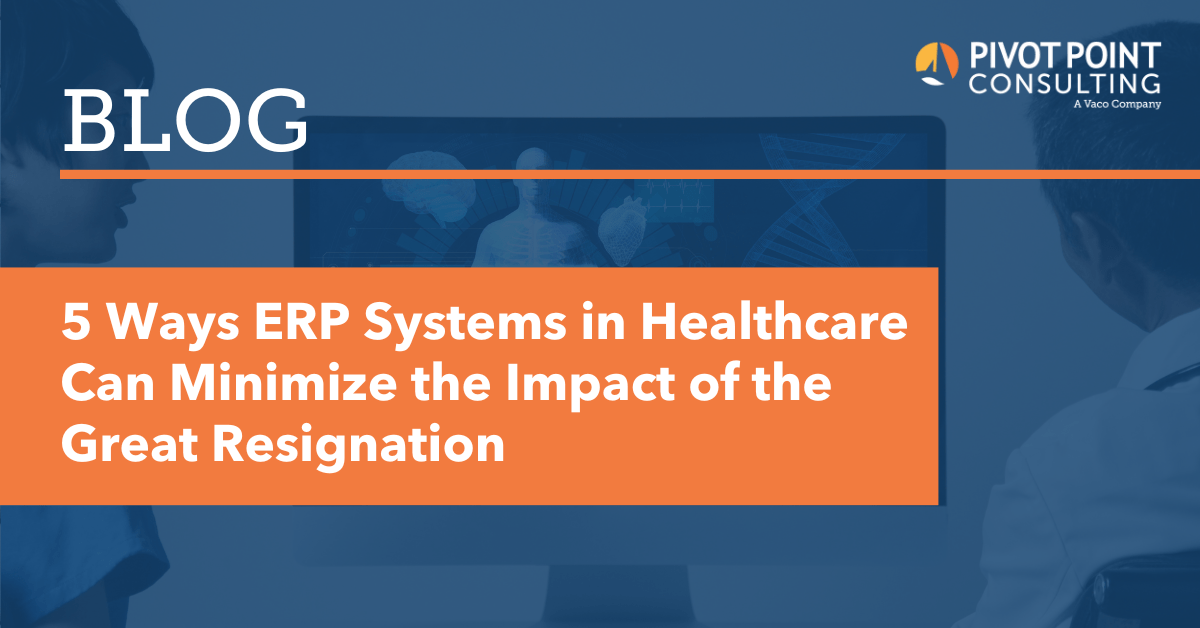The Great Resignation is proving to impact a multitude of teams within healthcare organizations. Not only is this felt among direct patient care workers, but it also impacts important roles in health IT and other vital departments that support the organization. Administrators, human resources professionals and other leaders continue to focus on finding ways to increase employee satisfaction and retain good talent.
One way to ensure employee satisfaction is to increase and/or optimize employee engagement. This can be done through a variety of programs and initiatives like routine performance check-ins, recognition programs and training that supports professional development/community volunteer opportunities.
Many organizations are also focusing their attention on updating or optimizing their HRIS (human resources information system) and other ERP software systems to improve engagement. Here are 5 ways integrated ERP systems in healthcare can help recruit, engage and retain the very best employees:
1. Employee Self-Service via HRIS System
A good HRIS system offers employees a direct service as a one-stop-shop where they can have ease of interaction from the office/workplace, home or even via a mobile device. This includes:
- Viewing and requesting PTO
- Reviewing open positions and career path progressions
- Participating in open enrollment or making changes to existing benefits for a qualifying event
- Viewing total compensation and other rewards
- Viewing work schedules
- Participating in performance review check-ins and 360 of peers
- Accessing current and past pay stub history
- Downloading W2 and other tax documents
- Updating W4 withholding
2. Employee Recognition and Engagement with ERP Systems in Healthcare
Modern systems have made drastic improvements in this area. Research shows that employees want routine engagement and pulse surveys to lend their voice in how the organization can improve. New systems in the HRIS allow for this routine engagement, recognition and serve as a “pulse” at any given moment for how the employee population is doing for insights and actionable work to improve morale and make changes as needed.
3. Professional Development
Modern systems make it possible for all employees to participate in training that advances their skillsets and increases their value to the organization. When tied into performance reviews, this is a valuable tool that managers can do to keep their best employees engaged and help them grow, and for those employees who may be struggling, an opportunity for good coaching and mentoring. Volunteering and community involvement are other ways that organizations help engage staff and increase their professional development.
4. Recruiting through ERP Systems in Healthcare
Lots of work goes into finding the very best candidates and this is one of the areas that modern HRIS and ERP software can help improve. With the right selection, recruiting can be a seamless process from initial position request to an employee accepting an offer.
5. Benefits Management
The right system can ensure that benefit selection and management becomes a tool to retain employees and attract more talent. These are areas where employees can take control of their finances by managing contributions to retirement plans and more.
All of This From the Comfort of Home
With the right system in place, employees can take advantage of these areas from the comfort of home.
In addition to HR, there are financial improvements that help attract and retain the very best talent. An integrated HR and financial ERP system can help with the front-end employee satisfaction to view paychecks, manage direct deposit, submit expenses, view W2 tax information and make changes to W4 withholding all from the comfort of home or via a mobile app.
Finance teams appreciate the added bonus of modern technology. The management of general ledger, accounts payable, invoicing and other important finance activities becomes more efficient.
The pandemic taught us that the supply chain is very important to our day-to-day lives. This is in no way more evident than in the healthcare space. A great supply chain ERP software provides forecasted insight into back-orders or product unavailability before they happen to avoid disruption. Overcoming back-order issues has a positive impact on both supply chain staff and front-line workers. Both parties depend on these supplies to provide quality clinical care.
Final Thoughts on ERP Systems in Healthcare Spaces
Healthcare is unique in the ERP software space. Modern business system selection should include a vision and roadmap that supports the goal of working better, faster and smarter. The end mission should be to provide the very best in quality clinical care.
Technology improvements in these areas are certainly not a full-proof panacea. It is just the opposite.
ERP optimization or system selection are only a few tools in the toolkit to ensure satisfaction and retention of the best employees. If planned correctly and coupled with an overall change management plan and as a part of the overall culture of employee engagement, ERP systems in healthcare play a vital role in minimizing the effects of the Great Resignation.
Before engaging in any new ERP solution or business system selection, upgrade or optimization, engage with a healthcare IT consulting partner with clinical experience in both clinical and well-versed in the important integration points and clinical workflows that must be supported. Pivot Point Consulting tailors our healthcare ERP system assessments to the unique needs of your healthcare organization to uncover opportunities and support your business goals.


